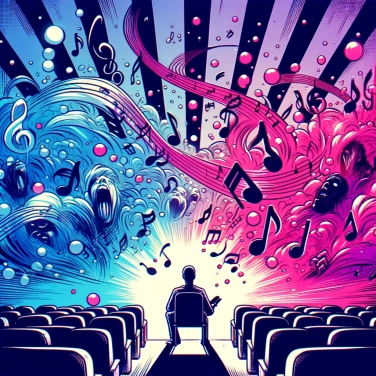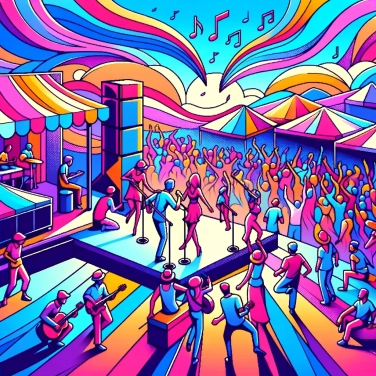Horror films use music to create tension among viewers because music has a powerful impact on our emotions and can enhance the scary atmosphere of the film by anticipating moments of suspense or fear.

The human brain strongly associates sounds with emotions. When watching a horror movie, our mind is particularly sensitive to unexpected noises, discordant sounds, or repetitive and haunting music. These sounds have the ability to quickly trigger deep emotional reactions, particularly by activating areas of the brain associated with instinctive fear and the feeling of immediate danger. A simple high note held for a long time, an unsettling rhythm, or even the abrupt absence of music can destabilize our usual perceptions and create a feeling of unease. It is this sonic uncertainty that leads to the anxious anticipation of danger, sometimes present, sometimes imaginary, placing us in a state of perpetual alertness.
Horror films often play on very high-pitched sounds like screeching violins or endlessly sustained notes to stress the viewer. Composers love to slip in unexpected sounds, strange noises, or abnormally long silences to create a feeling of unease or anxiety. The use of crescendo (gradual increase in sound intensity) is common: it prepares for an explosion of action or a sudden shock known as a jump scare. Conversely, subtle dissonance, like disturbing melodies or deliberately uncomfortable harmonies, creates a constant tension that keeps the viewer perpetually anticipating the worst. One also often notices simulated heartbeats or deep pulsations to create an instinctive connection with our own accelerating heartbeat.
Music directly alters how you perceive what you see on the screen. A mundane scene quickly becomes unsettling with the right sounds. Your brain uses music to rapidly interpret what your eyes are observing. As soon as a tense melody starts, you immediately expect a potential danger, even if the image itself isn’t really threatening. Essentially, music conditions your mind: you perceive faces as more menacing, shadows as darker, and innocuous movements seem suspicious. Research clearly shows that even the same visual scene appears much more intense and anxiety-inducing due to an appropriate soundtrack. Your brain amplifies negative visual details because the music puts it in a state of extreme alertness.
When you hear horror music, your body reacts quickly: your heart rate accelerates, your muscles tense up, and your breathing becomes irregular. Your brain then releases substances like adrenaline and cortisol, the famous hormones responsible for stress and alertness. These hormones sharpen your senses and focus your attention on the slightest detail — it’s as if your body is preparing to face an imminent threat. High-pitched or discordant sounds, often used in horror films, particularly stimulate your emotional brain, causing a direct increase in feelings of fear and anxiety. Even though you know you are safe in front of your screen, your body reacts as if it were in real danger.
The shower scene in Alfred Hitchcock's Psycho uses screeching violins to create intense stress in the viewer, clearly signaling danger. The famous theme from Spielberg's Jaws, with its two repetitive low notes, suggests the shark's imminent approach without even showing it on screen. In Halloween, the repetitive melody composed by John Carpenter induces constant anxiety, subtly preparing the audience for each appearance of the killer. The unsettling music of The Exorcist, notably the piece Tubular Bells, amplifies the supernatural and eerie atmosphere of the story. Finally, The Shining uses dissonant pieces that create a stifling ambiance throughout the film, making even mundane scenes strangely threatening.
The technique known as the 'shepard tone' is a sound illusion widely used in cinema to create the impression of a perpetual crescendo, building endless tension. This subtle method has been utilized in several thrillers and horror films to intensely disturb the audience.
The famous high-pitched violin theme in Alfred Hitchcock's film 'Psycho' was composed by Bernard Herrmann specifically to create a strong feeling of discomfort in viewers, almost mimicking human screams.
Certain very low sound frequencies, known as infrasound, are sometimes used in horror films and are inaudible to the human ear but can trigger subconscious anxiety, thereby increasing the viewer's feeling of fear.
John Carpenter, the director of the horror film 'Halloween', composed the film's original score himself. The repetitive and minimalist theme has become iconic, demonstrating that simple music can significantly enhance the tension on screen.
Yes, the music from horror films has been shown to be capable of provoking physiological reactions such as an increased heart rate, elevated blood pressure, irregular breathing, and even increased sweating. These reactions result from the state of alert triggered by the anxiety-inducing sounds and the anticipation of a potential danger.
Among the musical techniques commonly employed are progressive crescendos, dissonant chords, the widespread use of extreme high and low notes, as well as unexpected or sudden sound effects to provoke jump scares. These techniques all contribute to enhancing the emotional and psychological impact of horror scenes.
Yes, several studies and experiments have shown that the absence of music significantly reduces the emotional impact and tension felt by the audience. Music plays a crucial role in the psychological preparation of the audience for moments of unexpected fright or prolonged suspense.
Silence is strategically used to create anticipation and heighten the viewer's attention to the subtle or unsettling sounds to come. Alternating with music, silence can be particularly unsettling, as it disrupts the auditory expectations established by the audience and amplifies the feeling of uncertainty.
Some sounds and instruments generate a feeling of unease due to their unusual frequency, dissonances, or unpredictable nature. Our brains are instinctively programmed to detect these auditory anomalies as potential signals of danger or unpredictability, triggering a state of alertness or anxiety.

No one has answered this quiz yet, be the first!' :-)
Question 1/5